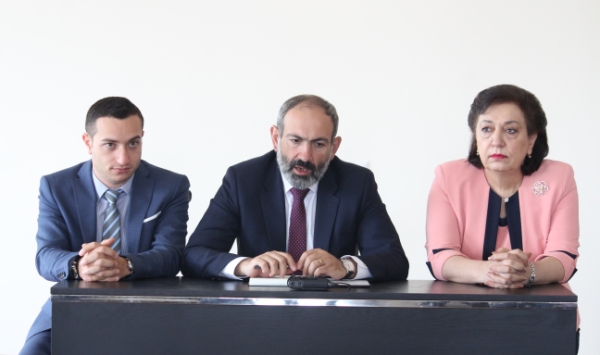
The song from “The Wizard of Oz” just kept coming to mind as I sat down to write this article. The contrast between the previous Diaspora Minister of the Republic of Armenia and the current one was just so stark. Mkhitar Hayrapetyan replaced a woman, Hranoush Hakobyan, who was the quintessential, stereotypical, dour, Soviet, and unproductive functionary, and by virtue of that fact alone, he is a breath of fresh air.
The Los Angeles area community had an opportunity to hear from the new guy on Monday, July 30 in Glendale’s Pacific Park. Judging by the extensive applause he received, most of the hundreds in attendance were quite satisfied with what he presented.
He seems open-minded with a lot of new ideas. He was welcoming and non-exclusionary, to the point that when a member of the audience recommended barring participation by many of the established organizations for not being supportive enough of the Velvet Revolution, he almost chided the person. Instead, he insisted that any person or group who/that wants to work with the Diaspora Ministry would be welcomed. We also learned that the ministry of 88 employees would be reorganized.
An interesting… idea he presented was that there must be mutual assistance between homeland and Diaspora, that the relationship should not be one-way, and that both have things to offer the other and can fulfill one another’s needs.
An interesting and relatively novel idea he presented was that there must be mutual assistance between homeland and Diaspora, that the relationship should not be one-way, and that both have things to offer the other and can fulfill one another’s needs. A conclusion about this matter ultimately requires a consensus as to the role of the Diaspora and its permanence or impermanence. Relatedly, he was of the opinion that a strong Diaspora begets a strong homeland, and vice-versa.
Other ideas he presented included the idea that education is foremost. Hayrapetyan observed that Armenian school textbooks prepared for Diasporan consumption must be sensitive to local variations present in our world-wide communities. He was dissatisfied with the absence of serious research into the causes and roots of assimilation. Regarding this, the answer seems painfully self-evident to someone living in the Diaspora, but perhaps that’s no so easily perceived by someone living on Armenian soil. Conversely, it’s also reasonable to want a more scientific assessment of any matter we want to address.
When the time came for questions, they mostly were not—questions, that is. As is often the case, most people who came up to the microphones had long-winded assertions, which most often didn’t even end with a question. This ate up a lot of time and led to some dissatisfaction among those who waited their turn to ask, but never got a chance since time was limited and the hall had to be emptied.
The only oddity was perhaps the minister’s request that cameras be turned off at the beginning of his remarks, because he was going to address some sensitive material. It remains a mystery to me what he was leery of hitting social media in what he proceeded to present. He had no qualms about the recording of the bulk of the program.
He dedicated serious time and attention to the recent announcement by Azerbaijan that it would be spending large sums of money to organize their “diaspora” as a counterweight to the Armenian Diaspora. While this is certainly a concern, I think he made too much of it. There are two very different processes at play here. When people form and join organizations to pursue shared ideals goals, it makes for a very powerful presence. But when people are moved by money—organizing from “above” as it were—their hearts are not in the work they do in the same way as self-initiated volunteers. Just look at how far Turkey has not gotten after its three or four decades of “organizing” Turkish expatriates in the United States.
When people form and join organizations to pursue shared ideals goals, it makes for a very powerful presence. But when people are moved by money—organizing from “above” as it were—their hearts are not in the work they do in the same way as self-initiated volunteers.
Another minor blip was the overstatement of the numbers of people who participated in solidarity demonstrations in the Los Angeles area. I wish the numbers he cited were real. It’s too bad that those who were the prime organizers of those actions chose to mislead our compatriots in Armenia.
Overall, I was favorably disposed towards this new Diaspora Minister, including his honest and very reasonable observation regarding a number of issues, as well as his explanation that because it had only been three months since the new government took office, and quite suddenly at that, many matters are still being analyzed before action is taken.
If you were unable to attend, find a recording of the event and watch it. Or, if Mkhitar Hairabedian is scheduled to appear and speak near you, make every effort to attend.
Author information
The post “Ding dong, the wicked witch is dead…” appeared first on The Armenian Weekly.
Source: Armenian Weekly
Link: “Ding dong, the wicked witch is dead…”
